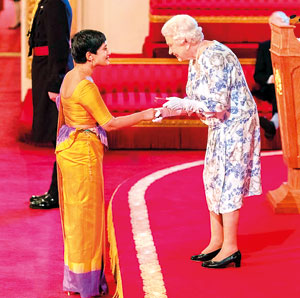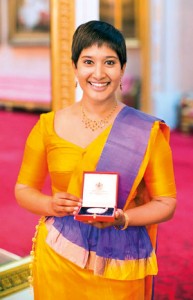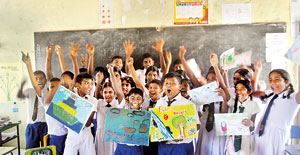Arts
A gift for the children she works with

At Buckingham Palace: Nushelle receiving the award from the Queen
Nushelle de Silva, 27, received the Queen’s Young Leaders award on Thursday, June 23 for her work with peace and reconciliation projects via Building Bridges in Sri Lanka. The award was presented by Queen Elizabeth to young leaders from 45 Commonwealth nations at a ceremony at Buckingham Palace as part of the Queen’s Young Leaders programme which celebrates the achievements of young people taking the lead in transforming the lives of others and making a lasting difference in their communities.
Nushelle initiated Building Bridges in 2012 inspired by her experience of visiting Jaffna as a 16- year-old schoolgirl at Ladies’ College. She worked in two border villages between Mullaitivu and Mannar- Chiraddikkulam (a Tamil community) and Kakkaiyankulam (a Muslim community)-both displaced and rehabilitating after the war, via an organisation known as Citizen’s Initiative initially (but the project soon developed a life of its own).
Utilising a grant from Princeton Reachout 56-81-06, and later partnering with volunteer link organisation Connect Lanka, Nushelle and her partner Irfadha Muzammil expanded the project steadily, using theatre as a primary tool. In addition the programme uses a range of other creative media such as creative writing, and arts and crafts as well as team-building games to help students express themselves and work together.
Nushelle is currently a PhD student at MIT in History, Theory, and Criticism of Architecture and Art. She holds a Bachelor of Arts in Architecture from Princeton University and a Master of Science in History, Theory, and Criticism of Architecture from MIT.
Here are excerpts from an email Q&A.
Over the last couple of years in particular we’ve seen the theatre community becoming more mindful about the role theatre can play in community building and reconciliation-what was it that inspired you to start this project back then?
I was born in Australia, and was bullied as a child because I was brown. I took those taunts to heart, and for a long time I was convinced I would never have friends. When I was seven, my family moved to Sri Lanka and I was enrolled at Ladies’ College. I will forever be grateful to my teachers and peers for collectively drawing me out. I would say I was a voracious reader. It was in part a coping mechanism – a year after I joined, my brother was diagnosed with leukemia (he would later recover) and my mother took him back to Australia for treatment. I was struggling to learn Sinhala, but I was living with grandparents who couldn’t really help me master my mother tongue.
In grade 8, we had auditions for inter-house plays, and a friend’s sister (in another house) suggested to my house captain that she audition me. I learned so much. About empathetically embodying an unlikeable character and making it my own. About discipline and focus. About how weirdly freeing it is to behave in a way I would never dream of doing in my everyday life. About how absolutely beautiful it is to make friends, who continue to be my friends to this day. I wanted to be able to pay forward that gift I was given, which made it natural that I chose to use theatre in creating Building Bridges.

All smiles: Nushelle with her award. Pix courtesy BCA (British Ceremonial Arts)
A concern when starting a project like this is about sensitivity- what advice would you have, in terms of your own experience, about establishing good contacts, building reliable networks, and choosing the communities you work with?
We talk about white saviour complex, but not the equivalent of when a girl from Colombo waltzes in to two villages and does a bunch of theatre workshops for a year. Power is unequal in cases like these, and it’s really important not to impose, to think you are better than them, or that you’re really making some kind of miraculous difference in their lives. I think it’s important to doubt what you do; I kept a blog in which I tried to be truthful about my mistakes, my naïve assumptions, and my self-doubt. I probably learned more from the kids I worked with than they learned from me.
At the same time, I think there is value to the kind of structured playtime that I engineered. I drew on all the lessons and skills I learned as a child from my parents and at school, and that I think continue to serve me well as an adult. I think we underestimate showing up. I tried to keep my promises (it wasn’t easy during the monsoon, and sometimes I failed) and I tried to be a constant. I think my point of difference with Building Bridges is really small actions undertaken consistently over time, and my hyper-awareness of the politics of what I do.
How has Building Bridges evolved from when you started?
It was only supposed to be a one-year project, which continues to exist only because I found so many people who believed in it, so I’ve had to learn a lot about making an idea like this sustainable, about monitoring and evaluation, thinking about business plans, and about efficacy in general. This is where the Queen’s Young Leaders award comes in – it’s basically a one-year leadership course, coupled with mentoring for six months, and the opportunity to connect with people who can really open doors for you. I don’t want Building Bridges to just continue to be after-school workshops – it would be fabulous if the tools and techniques we teach eventually become part of the national curriculum.
I’m trying to figure out partnerships with students in the arts who are equally passionate about reconciliation and eventually working with policy-makers who also think that these kinds of soft skills – collaborative and compassionate communication, critical thinking, and creative problem-solving skills – are vitally important to be taught in schools.
The Queen’s Young Leaders award recipients were announced in December last year-what has the response been since then, and in what ways will this recognition change the scope for your work?
I applied because of its leadership development course and mentoring component, but I’ve really struggled with identifying as a ‘leader’. I believe the future of work is all about non-hierarchical collaboration, and I’m trying my best to incorporate that belief in my own projects. Because of this, I’ve really struggled with boldly approaching potential collaborators and introducing myself in terms of this award. The course and the residential week have given me a lot of clarity, though. I’m a bit taken aback at the number of doors that are opened to us as a result of the award, and the credibility it confers, so I’ve shifted to thinking of future partnerships in terms of the responsibility I have to share the gift I’ve been given, which makes me better able to make bold requests – not for myself, but for the people I work with.

Totally involved: Children at the Building Bridges workshop in April. Pic by Amalini De Sayrah
It’s also changed how I view myself and my work. I have spent a lot of time and energy working on Building Bridges, but I used to talk about it as though it were a small side-project. It’s really not. It’s one expression of the ideas and issues that consume me daily – about belonging, about social inclusion, and about the tension between ethno-religious and national identity. The games I teach are simple, but the thinking behind them is not. I think the greatest gift that the Queen’s Young Leaders Award has given me is permission to really own my work.
How can other young people be involved with what you do?
We’re exploring creative partnerships with other organisations doing work in the arts, and in April Building Bridges did a three-day immersive visual arts workshop which was led by Irfadha Muzammil in collaboration with the Music Project, for ethnically diverse kids from Kurunegala and Mullaitivu.
We’re looking for partners – particularly in the arts, in peace-building, and in education policy – who also believe this, and who believe that immersion in the arts can hone these skills. There are a lot of people doing incredible work in Sri Lanka, and we’re excited about the prospect of joining forces to do work that is more effective and efficient. We’re eager to collaborate with existing organisations working on similar solutions, and with researchers who can help distil what we all do into a series of best practices for the future. If you want to get involved, email us through the Building Bridges blog or at buildingbridgeslk@gmail.com

